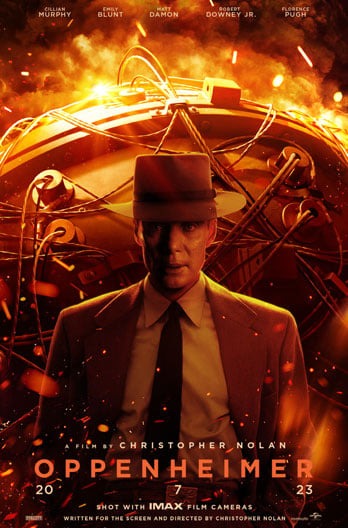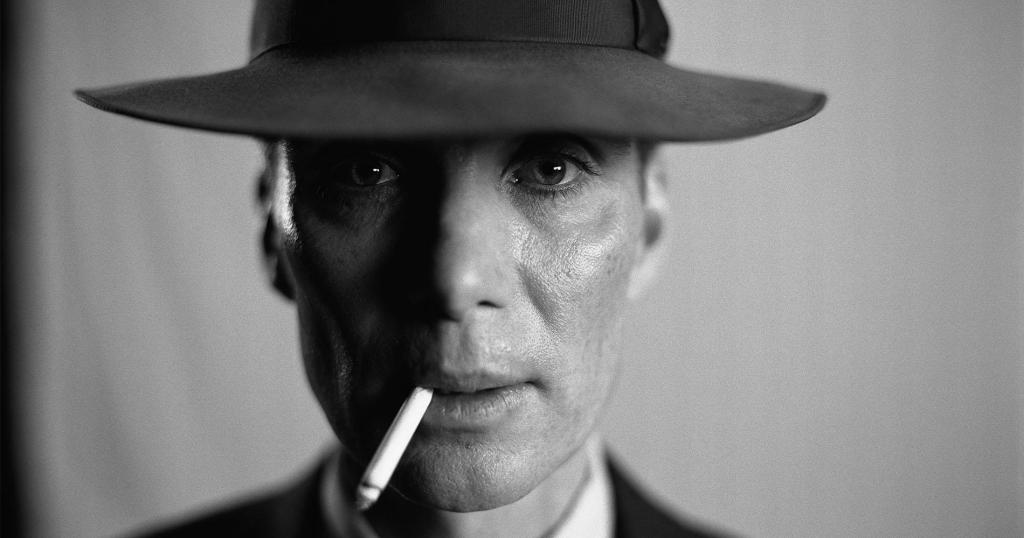Director: Christopher Nolan
Cast: Cillian Murphy, Emily Blunt, Matt Damon, Robert Downey Jr., Florence Pugh, Josh Hartnett, Casey Affleck, Rami Malek, Kenneth Branagh, Benny Safdie, Dylan Arnold, Jack Quaid, Gustaf Skarsgård, Josh Peck, Dane DeHaan, Olivia Thirlby
Genre: Biography/Thriller
Run Time: 180 min
Opens: 20 June 2023
Rating: M18

A three-hour-long biopic about a scientist released during summer movie season amidst tentpole franchise entries, instead of in the usual awards season bracket? If anyone could make something like that into a must-see-in-the-theatre event, it would be Christopher Nolan, who has become a brand name himself. The writer-director tackles the life and career of J. Robert Oppenheimer, the father of the atomic bomb.
Oppenheimer is based on the Pulitzer Prize-winning book American Prometheus: The Triumph and Tragedy of J. Robert Oppenheimer by Kai Bird and the late Martin J. Sherwin. Oppenheimer (Cillian Murphy) is a physicist who is appointed by Lieutenant General Leslie Groves (Matt Damon) to head up the Los Alamos laboratory of the Manhattan Project: a research and development program backed by the US military to develop atomic weapons. The team of scientists working on the project includes Ernest Lawrence (Josh Hartnett), Richard Feynman (Jack Quaid), Kenneth Bainbridge (Josh Peck), Luis Walter Alvarez (Alex Wolff) and Edward Teller (Benny Safdie). Despite his contributions to ending the Second World War, doubt is cast on Oppenheimer’s true allegiance, with chairman of the U.S. Atomic Energy Commission Lewis Strauss (Robert Downey Jr.) launching a security hearing to probe Oppenheimer’s actions and background. The film also covers Oppenheimer’s relationship with his brother Frank (Dylan Arnold), with his wife Katherine “Kitty” Oppenheimer (Emily Blunt), and his affair with psychiatrist Jean Tatlock (Florence Pugh).

Oppenheimer is, in many ways, a masterclass in the biopic genre. It’s a movie that doesn’t want to settle for easy answers and a black-and-white interpretation of historical events (though part of it is shot in black-and-white). The movie’s formidable ensemble is led by Cillian Murphy in a career-best performance. Murphy skilfully essays Oppenheimer’s intelligence, his idiosyncrasies and flaws, and how he reckons with his role in the deaths of thousands. This is Murphy’s sixth collaboration with Nolan, and the trust that the director and star have formed plays a part in creating a soul-baring, affecting portrayal that is far from the uncritical hagiography some feared it might be. Cinematographer Hoyte van Hoytema uses the IMAX camera not just to capture sweeping vistas of Los Alamos, but also to capture haunting close-ups in which Murphy’s eyes do all the work.

Nolan is a filmmaker who has actors lining up to work with him, with Downey, Blunt and Damon reportedly taking pay cuts to be in the movie. There’s a deep bench here, and more than in some of Nolan’s other movies, the dynamic among the cast and the way the characters play off each other is what keeps the movie going, and what lends it a humanity beneath its sombre, heavy exterior. Each character is complicated and their personal, professional and political lives collide in various messy ways, and Oppenheimer is a movie that’s interested in the breadth of that impact.

Like any big-name director, Nolan has his detractors, and they’re unlikely to be won over by Oppenheimer. The movie is ultimately three hours of mostly dialogue – it’s rendered as exciting as it can be, but sometimes the stylistic flourishes feel like they’re there to add excitement when there isn’t a lot to be found. We get several sequences that are visualisations of Oppenheimer’s conception of the quantum world and energy waves, which might be atmospheric for some and distracting for others. Nolan has drawn a lot of criticism for the way he writes women characters, and while both Emily Blunt and Florence Pugh are fully engaging with the material, the movie doesn’t give either actress a great deal to do. Oppenheimer’s branding as a Big Important Movie could also turn off some audiences, but for others, it’s canny counterprogramming to intellectual property-driven summer blockbusters.

The movie’s major set-piece – maybe its only set-piece – is a depiction of the Trinity nuclear test. Nolan often boasts of using as little computer-generated imagery as possible, and the Trinity test sequence was executed with gasoline, propane, aluminium powder, and magnesium pyrotechnics and large-scale miniature models. It is a spectacular moment and the lead-up to it is pulse-pounding even though we know what’s going to happen.

Summary: Oppenheimer is a three-hour-long biopic about a theoretical physicist that is, somehow, a blockbuster. Writer-director Christopher Nolan is usually feted as a technical craftsman, but here, he reminds us how much of an actor’s director he is too. Cillian Murphy gives a career-best performance in the title role, illuminating Oppenheimer’s brilliance, flaws and idiosyncrasies. The ensemble cast is uniformly solid, and Nolan gives them room to imbue their characters with plenty of personality. Nolan’s critics, who often maintain that his movies are too self-important, are unlikely to be converted by Oppenheimer, but as a biopic in the guise of a blockbuster thriller, Oppenheimer is startlingly effective.
RATING: 4.5 out of 5 Stars
Jedd Jong
Pingback: Oppenheimer review | The movie and me